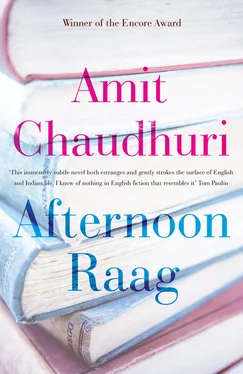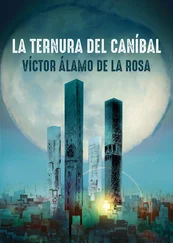On dry days, furniture would be piled outside the second-hand shops on Cowley Road. The pavement would be filled with wardrobes, armchairs, sofas, dressing-tables with mirrors, lampstands, in a space next to a bus-stop, where a strange woman would come to a man and say, ‘Could you spare me your cigarette-end?’ Certain areas were marked out and separated from the rest by smells of Kentucky Fried Chicken. Then, at last, came the Cowley Market Hall, part hardware and stationery store, and part a derelict precursor to the supermarket, a solid, unpolished shell where couples wandered to buy things — children’s toys, a hammer, writingpaper, liquorice. And, as one walked on and came marginally closer to London, this would end, these lives, with their idiosyncrasies, laughter, pressures, and sorrows, portrayed forty years ago in the black and white Ealing comedies and dramas, no grand characters in those films, only unforgettable bitparts, bit-characters, all this would empty out into the road turning right towards the John Radcliffe Hospital, or going straight past an elevation, green and wide and sloping upward, a public common where East Oxford seemed to vanish. It Always Rains on Sunday , both the title and the film itself express what goes on inside these houses, women with husbands they both love and do not love, memories of old beaux, old sweethearts, sudden extremities, sudden panic, then routine reasserting itself, and the rain that always hangs over these streets. Then, as the film ends, so does this small world, in a great vent and opening of space.
When I told Mandira that ‘Private Shop’ on Cowley Road was a sex-shop, she was curious to see it; she had never been in one before. I never took her there, though; it remained one of our many promised destinations. Anyway, it was difficult to get in without being noticed; and when one opened the door, a bell tinkled as in a drugstore in old American films. A man, pale, cheaply well-dressed, one of life’s jetsam, stood behind the counter, appearing to fidget busily with something, nodding and saying ‘Can I help?’ as you entered, as if you were just another customer and this just another shop, and then, as you looked around and became briefly engrossed, he would avoid, out of consideration, looking at your eyes, trying not to appear contemptuous, but anxious to confide and be truthful when asked questions. Magazines, three for the price of one, phone numbers, giggly dildos, pink perpendicular rubber organs arranged like confectionery, brought feelings, inside one, of surprise, laughter, and embarrassment. It was because it excited the first two emotions especially that it might have been a place for a couple to amuse themselves, but when I went there, I went alone; its wonders remained undiscovered by Mandira.
There were many promises to her I did not keep, promises to go to new places, towns, sleepy English villages, to vanish from Oxford for a holiday. And then there was her wish to discover, through me, herself, for her a heartfelt but simple demand, for me, almost impossible to comply. She would have had me possess her, to commit to extinction both our selves, while I always held back, selfishly, on the brink, refusing to take refuge inside her. So it was that we lived for a time in that space in which bodies exist on the borders of each other, separated by flesh, by the life of each, which, unadmitted by both, is actually moving in its own direction, towards its own future. In this way, we teetered on the brink of each other, and her desire remained superfluous and unfulfilled.
After a spell of depression, she decided to postpone her finals by a year; in Trinity term, she moved out of the college, packed her things in two suitcases and left while her friends prepared for their exams. She moved to a house in a blind lane off Cowley Road, a room with a wide, springy double bed, light pink walls, and tiny curtained squares that were windows. The house had a path, not more than ten feet long, leading to its door, and before the path there was a small unsteady wooden gate, of a child’s height, purely ornamental in nature, which would have kept nobody out. The house was owned by an old English widow with white hair and grey eyes, a sort of harmless English witch who looked as if she practised on the ouija board, but actually only nagged Mandira to remember to close the front door, to buy her own washing liquid, to pay her rent on time, to receive no calls after ten thirty, and who had dinner at six and watched television thereafter. She let out her rooms upstairs to students, or to anyone for that matter, for Mandira’s neighbour was a woman who worked all night and slept during the day.
Mandira then began to live more or less alone, cut off from her old friends, her college routines, and her tutor, an old don in spectacles. The only person who visited her then, besides me, who would drop by dutifully from time to time, was a nineteen-year-old English boy from college, awkward, inarticulate, his eyes hidden by a mop of hair, who loved Mozart and Beethoven, who communicated with Mandira by simply ‘being around’, by smiles, by listening as she talked of her problems, by nodding in agreement and uttering monosyllables to support his nods, by running her small errands, by making silent gestures like lending her his pullover. His name was Simon. He became even more silent and reserved when I was there, and remained, throughout, a witness to the precarious way in which our involvement began, and then the way it dwindled. He was one of the few English students in Oxford with working-class origins; his old parents, whose only son he was, lived in Dover; his father was a trombone-player in a four-man band. Simon was doing physics, one of those things you cannot learn, but must have an aptitude for. Of all Mandira’s friends, he remained the most faithful to her, accepted her as she was, overlooked her shortcomings; towards the end, he even transmitted to her his love of classical music, and I would find her sometimes, listening, with a self-conscious expression, to a Beethoven sonata.
Then, to supplement her scholarship money, Mandira began to work in the Covered Market, part-time jobs at a florist’s, and a cake-shop, for which she did not require a work-permit. In the morning, she would cycle to her library. After lunch, she would walk to Turl Street, and then enter the market, and, once inside her shop, she would wear a white apron over her clothes, and a white cap on her head, the uniform at the cake-shop. Because she was so fair, she looked almost, though not quite, English behind the counter; whenever I visited her, I bought a pastry or a tart, and she could not resist smiling at the nature of our meeting, the ridiculousness of her apparition in such a uniform, for she seemed, at such moments, to see herself from the outside. The lady at the shop, as the widow whose house she lived in, would ask her occasionally, ‘Is he your boyfriend?’ to which she would say, half pleased and half exasperatedly, ‘No, not really.’
Through her I became familiar with the Covered Market, with the intricacy and timelessness of its organization, its hours of business, when it served as a thoroughfare for students passing between Broad Street and High Street, its fixed closing-time of five o’clock, when the iron gates on both sides were shut and locked. Who would have thought, surrounded on almost every side by colleges, Jesus, Lincoln, and Oriel not too far away, Broad Street, Blackwell’s, and the Sheldonian on the other side, that here there was a place of buying and selling, a place that both quickened and constricted the appetite? For, not far away from the sweet-smelling, moist floors of the florist’s were the butchers’ shops with sticky larders and clotted blood, dead pheasants swinging upside down from hooks, fragrant carcasses, pig’s livers and trotters. Here, then, exposed, was the dark Anglo-Saxon love of offal which went back centuries. In another part of the market were stalls with stacked yards of silk, folded around a flat board, and the old system of measure here, and the way the shopkeepers busily touched and tested the cloth with their fingers, reminded me of the stalls of New Market in Calcutta, where people still speak of cloth in terms of the human body, and still speak sometimes of one or two ‘hands’ of cloth. Mandira worked, from two to four o’clock, in the midst of all this activity. For that period of time, she became, unquestioningly, part of that small community of shopkeepers, attendants, helpers, girls-behind-the-counter, as easily and completely as she had been, before, one of the student community. Once, I accompanied her as she swiftly and confidently took a cardboard box full of rubbish to that special, secluded area in the market where refuse was emptied, and collected later by a truck. She was herself, and yet wholly transformed.
Читать дальше












